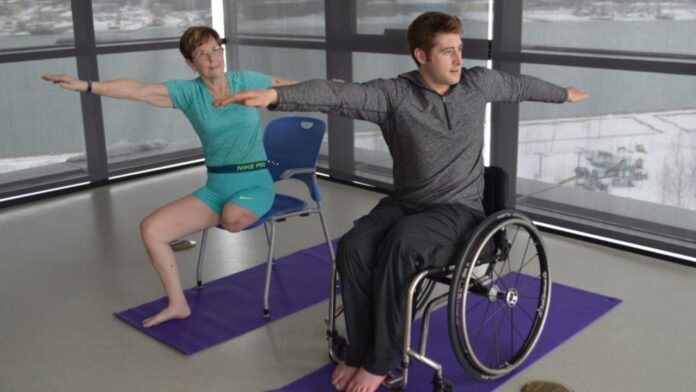According to experts, Yoga plays a crucial role in enhancing mental well-being for individuals with disabilities by addressing concerns such as anxiety, depression, and stress. This is because Yoga transcends mere physical postures, embracing a holistic approach that integrates the mind, body, and breath.
Pranayama, focusing on calming the mind, proves especially advantageous for those with disabilities. Simple breathing exercises, like deep belly breathing, can effectively reduce stress and anxiety. These practices provide a toolkit for emotional management and cultivating a sense of calm amidst life’s challenges.
Tailored physical postures, or asanas, designed to suit individual abilities contribute to both physical and mental well-being. These movements enhance flexibility, strength, and balance. Even individuals with mobility impairments can benefit from adapted seated poses, ensuring that the advantages of yoga are accessible to everyone.
Mindfulness, a pivotal aspect of yoga, plays a crucial role in mental health by encouraging individuals to be present in the moment. This helps manage overwhelming thoughts and fosters a more positive outlook, especially beneficial for those dealing with depression as mindfulness can disrupt the cycle of negative thinking.
Incorporating meditation into a yoga practice provides individuals with disabilities a valuable tool for stress management. Meditation techniques like guided imagery or focused attention offer a break from daily challenges and create space for mental rejuvenation.
Yoga’s emphasis on self-acceptance and non-judgment fosters a positive mindset, essential for individuals with disabilities facing societal stigmas or internalized negative beliefs. The practice encourages a shift in focus from limitations to possibilities, promoting a healthier self-image.
Moreover, the relaxation response induced by yoga positively impacts the nervous system, benefiting individuals with disabilities experiencing heightened stress levels. Yoga’s ability to activate the parasympathetic nervous system promotes relaxation, leading to an overall decrease in stress and anxiety.

 हिंदी
हिंदी






